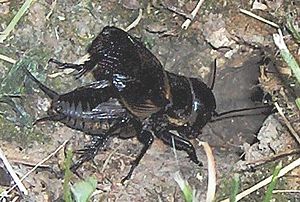Stridulation facts for kids

Stridulation is how some animals make sounds. They do this by rubbing two body parts together. This action creates a sound, much like playing a violin. Many insects use stridulation, but other animals do too. These include certain types of fish, snakes, and spiders.
Contents
What is Stridulation?
Stridulation is a special way animals communicate. It involves rubbing a rough part of their body against another part. One part is often called the "scraper." The other part is called the "file." When these two parts rub, they create vibrations. These vibrations then turn into sound waves. The sound can be loud or soft. It depends on the animal and its purpose.
How Animals Stridulate
Different animals use different body parts for stridulation. Insects often use their legs, wings, or even their jaws. For example, crickets rub their wings together. Grasshoppers might rub a leg against a wing. The sound produced can be very specific. It helps animals recognize each other.
Cricket and Grasshopper Sounds
Crickets are famous for their chirping. They have a special file on one wing. They also have a scraper on the other. When they rub these together, they make their song. Grasshoppers often rub their back legs against their wings. This creates a buzzing or rattling sound. These sounds are important for their daily lives.
Other Insect Stridulation
Some beetles can also stridulate. They might rub parts of their head or body. Certain types of cicadas can make sounds this way too. Even some caterpillars can stridulate. They might use tiny spines on their bodies. These sounds can be warnings or calls.
Why Animals Stridulate
Animals stridulate for many reasons. The main reason is communication. They use these sounds to talk to other animals. This can be about finding a mate. It can also be about warning others of danger. Sometimes, it's just to mark their territory.
Finding a Mate
Many male insects stridulate to attract females. The sound they make is like a love song. Females listen for the best song. A strong, clear song often means a healthy mate. This helps them find a partner to reproduce.
Warning and Defense
Some animals stridulate to scare away predators. A sudden loud noise can surprise an attacker. Certain snakes, like the sidewinder, can rub their scales together. This makes a rattling sound. It warns others to stay away. Some spiders also make hissing sounds. This happens when they feel threatened.
Marking Territory
Animals might use stridulation to claim their space. The sound tells other animals, "This area is mine!" This helps avoid fights. It also ensures they have enough food and resources.
Animals That Stridulate
While insects are the most common stridulators, many other animals do it.
Fish
Some fish can make sounds by rubbing bones. They might rub parts of their skull or fins. These sounds can be used for communication. They might also be used during mating rituals.
Spiders
Certain spiders have special structures for stridulation. They might rub their jaws or legs together. The sounds can be very quiet to humans. But they are important for spider communication.
Snakes
Some snakes, like the saw-scaled viper, rub their scales. This creates a distinct rasping sound. It's a warning signal to predators. It tells them to keep their distance.
See also
In Spanish: Estridulación para niños

